Robyn Mundy's Blog, page 4
May 25, 2016
Wildlight – Book of the Week
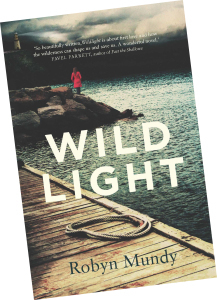 My new novel WILDLIGHT is Book of the Week at Coast FM in Auckland, New Zealand. Lovely reviewer Stephanie Jones writes:
My new novel WILDLIGHT is Book of the Week at Coast FM in Auckland, New Zealand. Lovely reviewer Stephanie Jones writes:
Nature is the star of Wildlight, the evocative new novel by Robyn Mundy…Mundy’s prose is redolent with the sights, sounds and scents of sea and sky: clusters of mutton-birds return to nest, the air filling with the rancid smell of their oil; fisherman risk their lives to bring in their catch in violent weather…
Above all, she acknowledges vagary, the element of chance that plays its hand in every existence: “Perhaps we navigate life that way. Perhaps we change course at precisely the wrong moment, blink and miss landfall.” Wildlight beckons to a reader seeking entry to a different world.
Check out the full review by Stephanie Jones. For those in New Zealand, enter the competition to win a copy!
Filed under: Wildlight Tagged: Auckland Coast FM, Book of the Week, Stephanie Jones


May 20, 2016
Image of the week: the face of a child
 When I saw Anna Swain’s striking images from her book BURMA, I knew I had met a photographic artist with an extraordinary sensibility. I invited Anna to contribute one of her favourite photographs for Image of the Week. I can see why she chose this one. Anna writes:
When I saw Anna Swain’s striking images from her book BURMA, I knew I had met a photographic artist with an extraordinary sensibility. I invited Anna to contribute one of her favourite photographs for Image of the Week. I can see why she chose this one. Anna writes:
Early in the morning at a local village market on the shores of Inle Lake, central Burma, I came across this tiny little person. She was sitting amongst the spices in her mother’s stall, eating a giant bowl of rice. Our eyes met through the lens and this moment was captured. She was undistracted by my presence and continued eating contently. Her beautiful face was painted with Thanaka, the traditional make-up used for sun protection. Life of a market child.
![medium res cover[1]](https://i.gr-assets.com/images/S/compressed.photo.goodreads.com/hostedimages/1463845037i/19166650.jpg)
Anna developed a love of photography from an early age. Two years ago, after a life changing trip to Burma (Myanmar), she published BURMA — Tiffins, Nuns and Turmeric, a photographic journey through a mystical land, capturing the culture and its people. A premium quality hardback production, with almost 300 photographs to feast on. Available online at www.shutterbooks.com.au
Filed under: Image of the week, Uncategorized Tagged: Anna Swain, Burma, photography


May 15, 2016
The real cost of loaning out a book
Who hasn’t borrowed a book from a friend, or loaned one out? I raise my own hand here. Some time back I even heard the host on a national television book show offer to loan a novel to a fellow panellist. That makes it okay. Right?
WELL, NO.
When a reader tells me that they loved my novel WILDLIGHT, I want to cartwheel through the house then pirouette along the street. But the joie de vivre subsides when the reader adds, enthusiastically, that they’ve loaned their copy to a friend.
OH…
Recently a local book club invited me to join their forthcoming meeting, WILDLIGHT being their selected novel. Yeah! I am delighted to attend book club gatherings when I can, and ever grateful to have my book read and discussed. In fact most authors I know are good sorts, eager to contribute to book clubs, appreciating that each member has purchased the novel, or borrowed it from their public library. With this particular invitation the host innocently explained that she hadn’t yet read WILDLIGHT as it wasn’t her turn. Her turn? The club, it seems, shares a copy, passing it down the line, reader by reader.
IN THE SPIRIT OF TOGETHERNESS, IN THE INTERESTS OF ECONOMY, WHY NOT SHARE?
Here’s why.
When an author has a novel accepted by a publisher, the publisher determines how many copies will be printed based on how many copies they believe will sell. The publisher pays the author a royalty in advance, being an amount per book for predicted sales. For authors in Australia, excluding best selling authors, the print run can be as low as 1,000 copies for a small publisher, or up to 5,000 copies for larger publishers. Royalties will be around 10% of the recommended retail price, amounting, all up, to a few thousand dollars. Modest reward for what amounts, in the case of WILDLIGHT, to two years of writing, months of research, and time and effort in promoting the published novel. I am not alone here. A 2015 survey of Australian authors conducted by Macquarie University revealed that the average Aussie author earns less than $13,000 per year from their writing. Call us knuckle-heads for choosing such a profession. The majority of us supplement our choice to write with other income-earning work. The publisher is not the bad guy here. They carry significant financial risk by investing resources into assessing, editing, producing and marketing the book.
If a book sells in excess of the predicted volume, everyone wins. The publisher finally makes a profit (they barely break even on many books), and the author is paid their due royalty for each book sold. Even more importantly for the survival of the author, book sales help protect our future. When the time comes to offer the publisher our next novel, in a commercial climate that for any writer remains forbiddingly unassured, the publisher will reflect on how the previous work performed in determining whether or not to support the new one.
Every time a book is shared, no matter how well intentioned, it means another chink in an author’s armour.
BUT NOVELS ARE EXPENSIVE TO BUY!
Look at it this way: in Australia a new novel retails for $24 – $32. An outlay, for sure, but one that provides hours of reading pleasure, and can be read again, like a favourite bedtime story. A ticket to a new release movie—2 hours of single viewing entertainment—costs around $20, more for ‘gold class’. If I want to purchase Season 2 of Outlander (which I desperately want to see), I’ll need to cough up $38 in return for 5 chapters of time travel. If I head out to a restaurant, or buy a special bottle of wine… you get the picture.
Remember to soak up your public library. Libraries are wondrous, welcoming, switched-on places with bright-eyed staff, themselves keen readers who are happy to offer reading recommendations. Did you know that with each copy of your book held at an Australian public library, the author and the publisher each receive a royalty payment from the Australian government? An author will earn around $2 per eligible book held at a library, while the publisher earns around 0.50 cents per book (2013 figures). Public Lending Rights, as they are called, compensate authors and publishers for lost income in a public library situation where a single copy of the book is utilised by multiple readers. You’re helping the cause every time you make use of your library!
MORE PROSELYTISING? I GET IT.
Okay. Okay. Then let me finish with this. I fully understand the temptation to loan out a book to a fellow reader. But speaking for the authors I know, we work long and hard to carve out a skinny little space on the planet. We owe our existence to our wonderful readers, and of course our publishers, bookstores and libraries. When you next read a book that you love, spread the word around (but please, not the book). Consider the 30 seconds it takes to rate and even review the book on GOODREADS, the world’s largest (and free) website for readers and book recommendations. Perhaps other readers will like it too, and tune in to your future ratings. Most importantly, give yourself a pat on the back for supporting Australian literature.
HAPPY READING!
Filed under: Publishing, Readers on reading, Uncategorized, Wildlight Tagged: borrowing a book, Goodreads, libraries, Macquarie University author survey, public lending rights


May 13, 2016
Light
A tempestuous weather week augured sad news from good friends. Mona’s Amarna: a place of stillness in radiant light, a place to consider how fragile and fleeting our lives really are. A grateful nod for many things, a reminder to be kind, a thank you to artist James Turrell and visionary David Walsh for creating this space beneath the night sky.
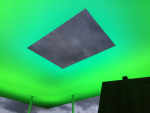
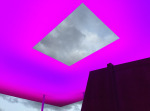
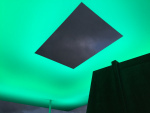
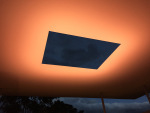
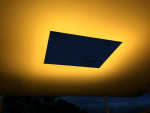

Filed under: Uncategorized Tagged: David Walsh, James Turrell, MONA


May 11, 2016
Image of the week
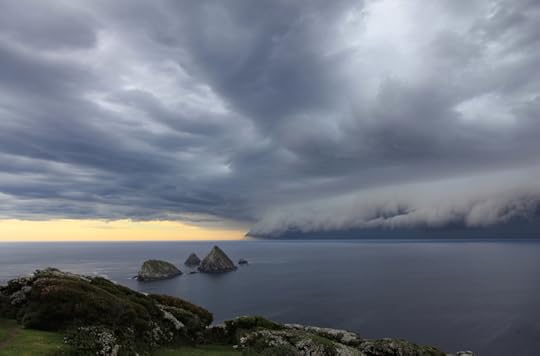
Storm front off Maatsuyker Island. ©Robyn Mundy
On a day of screaming winds and rain squalls right across this island state of Tasmania, I am reminded of this rain-bearing front approaching Maatsuyker Island. Within minutes Maatsuyker was deluged. During the writing of Wildlight I frequently drew upon my island photographs; this one helped build a scene for a destructive storm that would leave its mark on a fleet of fishing boats as well as those on the island.
Filed under: Image of the week, Uncategorized, Wildlight, Words for Writers Tagged: Maatsuyker Island, photography, Wildlight


May 6, 2016
The reluctant writer
Author Annabel Smith, who I interviewed a little while back (just scroll down), has launched a new series on her website called Coming to Writing. Annabel invited me to share my circuitous journey to becoming a writer. I’ve titled it The Reluctant Writer and you can link to it here.
Filed under: Uncategorized, Words for Writers Tagged: Annabel Smith, Coming to Writing, Robyn Mundy, The Nature of Ice, tips for writers, Wildlight, writing


April 28, 2016
Publishing: getting the word right
Thinking back to my debut novel, The Nature of Ice, in truth I found the first phase of editing—a developmental review—big and daunting. I felt I could never fully achieve what was asked of me. (Having said that, I was acutely aware of the editorial ‘critic’ whispering in my ear throughout the writing of Wildlight.) When it came to publishing Wildlight, I approached the editing with trepidation. Could I meet the demands? Would I want to? As fortune had it, the editing of Wildlight turned out to be a gentle and joyful experience. Picador’s editor JULIA STILES introduced herself with a cover letter detailing her thoughts on the story—praise, questions and suggestions, along with this reassurance: I just want to stress that any suggestions I have made are exactly that – suggestions; use those that resonate with you and disregard the rest. Julia’s cover letter, along with the annotated manuscript, assured me of how closely and astutely the editor had engaged with the text. Just as importantly, she seemed to genuinely like and believe in the story, inviting a relationship where I remained ultimate arbiter. I was in!
Here, I invite Julia Stiles to speak about the role of book editor. Her conversation is packed with valuable information for writers and readers. For those like me who welcome practical writing advice, be sure to read Julia’s thoughts on the revision process.
Over to Julia, who begins by sharing something about herself:
JS: When I was in my early twenties I had my palm read. I was about to leave my life in Sydney and sail a
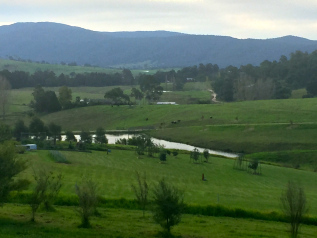 way on a yacht; naturally I was wondering what the heck I was doing and what awaited me on the high seas. Somewhat unexpectedly, the palm reader told me I would live surrounded by cows. Naturally I dismissed him as a phony but in fact he turned out to be right. Ever since I have been surrounded by cows — up in the Whitsundays for ten years and now down here in Bega on the far south coast of New South Wales. When I look up from my
way on a yacht; naturally I was wondering what the heck I was doing and what awaited me on the high seas. Somewhat unexpectedly, the palm reader told me I would live surrounded by cows. Naturally I dismissed him as a phony but in fact he turned out to be right. Ever since I have been surrounded by cows — up in the Whitsundays for ten years and now down here in Bega on the far south coast of New South Wales. When I look up from mydesk I see rolling green hills and well-fed Friesians. Actually, I try not to look up from my desk too often because a) such loveliness is distracting, and b) I might notice my teenagers running riot through the rest of the house.
How did you get into book editing?
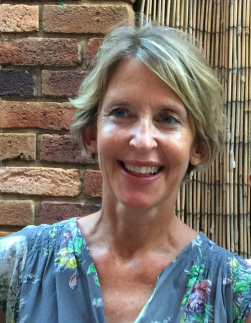 JS: Oddly enough, when I was about twenty I woke up one morning with the thought in my head that I was going to be an editor, even though I didn’t have the first clue what an editor did. I was at uni in England at the time and the careers adviser laughed at me and told me I should become an accountant. Thankfully I came to Australia instead because I have the sneaky suspicion I would have ended up in jail for embezzlement. In Sydney I sent out my cv to every publisher in town, still completely ignorant of what an editor did. Thankfully James Fraser, then the publishing director at Pan Macmillan, offered me a job as his secretary. Whilst I was proving myself incompetent at that I was given the opportunity to read through the slush pile and then eventually to learn from two very skilled editors – Jane Palfreyman and Fiona Giles – who gradually trained me up into an editing role.
JS: Oddly enough, when I was about twenty I woke up one morning with the thought in my head that I was going to be an editor, even though I didn’t have the first clue what an editor did. I was at uni in England at the time and the careers adviser laughed at me and told me I should become an accountant. Thankfully I came to Australia instead because I have the sneaky suspicion I would have ended up in jail for embezzlement. In Sydney I sent out my cv to every publisher in town, still completely ignorant of what an editor did. Thankfully James Fraser, then the publishing director at Pan Macmillan, offered me a job as his secretary. Whilst I was proving myself incompetent at that I was given the opportunity to read through the slush pile and then eventually to learn from two very skilled editors – Jane Palfreyman and Fiona Giles – who gradually trained me up into an editing role.
What do you regard as key qualities of an effective editor?
JS: For me the most important quality is to be able to listen very carefully to a writer’s intentions. This means being able to silence your own inner voice in order to inhabit someone else’s words. When I am editing I am not trying to fix anything or to impose my meaning on the text. I’m trying to help the writer to clarify their intentions, to find those areas of the manuscript they themselves are uncertain about, and to explore and trust in their own capacity to find the necessary solutions.
It’s important, too, to be a sensitive and perceptive reader. When I first started editing I had never studied the mechanics of writing but instinctively, having read so much, I understood how stories were put together. I don’t think you can be an effective editor, or writer for that matter, if you’re not an experienced reader.
How important is the relationship between author and editor?
JS: It’s the quality of the relationship that is most important – a writer needs to trust their editor and to know that they are valued and respected. It very much depends on the individual author how significant their relationship is with an editor. I’ve worked with some very successful writers who don’t place a great deal of importance on the relationship — as long as the quality of the relationship is high, they will work with any editor; they don’t need that continuity of care and insight to produce terrific work. On the other hand I’ve worked with writers for whom a personal ongoing relationship with their editor is paramount. One author I worked with for many years said that editing was like taking her clothes off in front of someone and she was only prepared to do that in front of me! The relationship can be extremely dynamic and creative and productive, but I don’t kid myself that an author isn’t able produce great work without me.
I felt that the editing empowered and contributed to the creative strengths of Wildlight. What result do you strive for? Do you have a memorable moment?
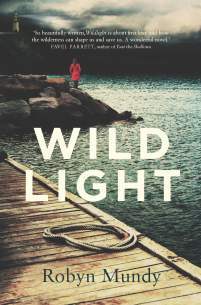 JS: I love your description of the editing of Wildlight and that was exactly what I hoped for. More than anything I want a writer to learn to trust themselves – as you say, to feel empowered to trust in their own creative capacity. It’s very satisfying when an author says, yes, I knew that wasn’t quite right but I didn’t know how to fix it, and then, simply through the process of having their manuscript reflected back to them, they find exactly the right solution. This is a very enlivening process, for them and for me.
JS: I love your description of the editing of Wildlight and that was exactly what I hoped for. More than anything I want a writer to learn to trust themselves – as you say, to feel empowered to trust in their own creative capacity. It’s very satisfying when an author says, yes, I knew that wasn’t quite right but I didn’t know how to fix it, and then, simply through the process of having their manuscript reflected back to them, they find exactly the right solution. This is a very enlivening process, for them and for me.
Funnily enough, it’s not the moments I remember that are most significant. Often I will say something quite unremarkable and it will trigger in the writer a cascade of productive ideas. It’s not me doing the work; it’s the writer.
Does it ever happen that an author outright rejects editorial suggestions? How do you overcome differences?
JS: Actually, I’m delighted if an author thinks carefully about my suggestions and then rejects them. (If they reject my ideas without careful thought, well that’s their prerogative too.) I’m not the authority on their manuscript, they are, and if they think something isn’t going to work they need to trust their own judgement not mine. My sense is that differences tend to be minimised and are more easily overcome if you have communicated to the author the ways in which you appreciate their work. It’s easier for them to trust your response if they know you have read their manuscript with care, empathy and respect.
What might surprise the everyday person about the editing role?
JS: Perhaps that the role exists at all. People often seem to think that the writer sits down and produces the work pretty much word for word as it appears in the finished book. They’re not aware that sometimes quite a considerable amount of developmental work has been done, or that in some circumstances the editor has in effect rewritten the book.
How would you define a great book?
JS: For me there’s a distinction to be made between great literature and great books. Great literature, well, that’s endlessly debated and very much depends on your cultural, historical and personal context. A great book, for me anyway, can be defined by its impact on the reader (and it may or may not be considered great literature by other people). A great book shifts something in your internal world; it creates ‘slight inner adjustments of which we are barely conscious’ (to borrow from WG Sebald). A great book makes you experience the world in a different, more expansive way. It opens you up to life, even if occasionally that opening is savage.
Before ever submitting a manuscript to a publisher, many writers spend a lot of time rewriting. Speaking for myself, it’s never easy to switch hats from writer to self critic. Do you have advice on ways an author can approach the revision process?
JS: Give yourself time. Put the manuscript aside for as long as you possibly can, so that when you return to it, it seems unfamiliar to you. Basically this is what an editor is bringing to your manuscript – perspective. Pay attention to the small voice that tells you something isn’t quite working; invariably it’s right and what is holding you back from listening to it is weariness or boredom. When you get stuck, set the manuscript aside and daydream; walk, swim, garden, dream – do anything but try to find a solution. It’ll come eventually, often in an unexpected way.
Of course saying ‘give yourself time’ is all very well, but time is often in short supply in publishing, not to mention in our daily lives. If you have a deadline I would recommend having a clear plan for your revision process. The following process reflects the way I work; it may not suit you, so find your own way with it.
Firstly, read the manuscript from start to finish without changing a word (this is surprisingly difficult to do). Then try to think about the story as a whole. You’re looking for a general impression, as though glancing at the story out of the corner of your eye. When you come to look at it head on (that is, when you look at it scene by scene, line by line) those initial impressions will fade (or you’ll try to ignore them), but in fact they’re an extremely valuable guide. Think about which parts were satisfying, which weren’t; what didn’t make sense; where the pace slowed; which characters were vivid, which flat.
Once you’ve identified the patchy areas, go in scene by scene and try to understand how each one contributes to the storytelling, or how it holds it back. I like the technique Ford Maddox Ford and Joseph Conrad called progression d’effet: ‘we agreed that every word…must carry the story forward and, that as the story progressed, the story must be carried forward faster and faster and with more and more intensity’. Think about how those scenes might change, and what effect this will have on the rest of the novel.
When you’ve made those broad changes to individual scenes, then start looking line by line at the whole manuscript. (Yes, it’s a long process, but many writers I have worked with say they enjoy the revision process.) Read aloud to someone if you’re not sure whether something sounds right or makes sense.
It’s helpful to show your work to readers whose judgement you trust, but make sure they are prepared to be honest with you, and you are prepared to hear what they say without holding it against them.
Are you able to switch hats, to go from editor to everyday reader? Do you have a favourite book?
JS: Yes, thank goodness, otherwise one of the greatest pleasures and consolations of my life would become confused with work. I read as an everyday reader all the time but I’m very choosy about what I read and I don’t persevere with a book just for the sake of it. I have so many favourite books it’s impossible to choose only one.
Huge thanks to Julia Stiles for this wonderful interview.
Filed under: Publishing, Uncategorized, Wildlight, Words for Writers Tagged: editing, Julia Stiles, Pan Macmillan, Picador, revision, The Nature of Ice, tips for writers, Wildlight


April 24, 2016
Top Shelf: Annabel Smith
TOP SHELF showcases a talented writer or artist who I admire. This month I welcome long-time writing colleague and friend Annabel Smith whose personal journey I find as compelling as the novels she creates. Annabel is the author of A New Map of the Universe; Whisky, Charlie, Foxtrot (branded in the USA as Whiskey & Charlie); and The Ark. Annabel regularly chairs and presents at writing festivals.

Annabel: I always feel proud to cite you as an inspiration to writers, particularly for these two reasons: No. 1: in the time of writing Whisky, Charlie, Foxtrot, you married, became a new mother and, despite the associated joys, felt despair at ever again finding time to complete your manuscript. Tell us about the writing deal you struck with your husband.
AS: Idiotically, I had imagined having time to write each day while my baby napped contentedly. My son shattered my delusions by deciding that two half-hour naps a day were plenty, which meant that, not only could I not write in the day, but by the evening I was too exhausted to even contemplate it. So on Saturday afternoons my husband would do his fatherly duty and I would go off to the library and write furiously until they threw me out. Those three or four hours each week saved my sanity.
No. 2: When I think back to Whisky, Charlie, Foxtrot’s long…long road to publication, I cite you as the Diva of Perseverance, particularly to fellow writers who are dealing with rejection. Spill the beans on that episode.
AS: Initially, I submitted the novel to agents—a dozen or so, mostly in Australia, a couple in the US and UK. On one occasion I came close to securing representation but in the end the agent was ‘not sufficiently enthusiastic’ (a phrase they’re fond of in their rejection letters). Then I began submitting to those publishers that accept unsolicited manuscripts—mostly small independent presses—collecting more rejections.
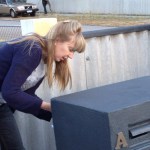
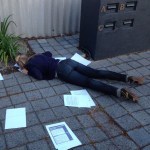

Each time I received a rejection I’d lose confidence for a while, but then I’d read a part of my manuscript and my confidence would return. If your work is good enough, finding someone who loves it becomes a numbers game: you just have to keep sending it out until you get it in front of an editor who connects with it. After 17 rejections I found that editor in Georgia Richter at Fremantle Press. Cue: tears, champagne.
Whiskey & Charlie was subsequently adopted by a USA publisher and chosen by megastore Target as their Book of the Month. What d’you say to that!
AS: It was beyond my wildest dreams! When I received the email from my publisher to say that Target wanted to print 30,000 copies, I wrote back to check that they hadn’t accidentally added an extra zero! When they confirmed that it was THIRTY THOUSAND I was so overwhelmed I actually cried. I had to sign 5,000 pages to be inserted. (A little known-fact about mass signings is that it is not the signing arm that gets tired—it is the other arm, which has to keep taking off the signed page to expose the next one.) The market is so ginormous there. It has made me so happy to know that many thousands more readers have read my book as a result of my publication there, and I’ve had some lovely responses from US readers. To be honest, I still have to pinch myself every time I get an update on the sales figures. (Check out Annabel’s hilarious time lapse)
What do you most treasure about your writing life? What are you most proud of?
AS: I treasure being able to build a life around what I love—so many people do not have that luxury.
I treasure the quiet space and time alone at my desk.
I treasure the momentum that occasionally comes after long periods of hard work, when the words pour out effortlessly. Writing feels like climbing a hill (or a series of them). You climb up—sometimes energetically, sometimes listlessly, meandering from side to side, perhaps limping, sometimes the progress is so slow you feel like you’re crawling. Then, suddenly you’re at the top and the view is unbelievable, and you go charging down the other side and it all feels worthwhile.
I treasure being part of a community of writers. I have met so many lovely people—writers and readers—through writing: online, and at libraries and bookshops and talks and festivals. Book people are the best people.
I’m proud of each book for different reasons: A New Map of the Universe, because it was my first book and I didn’t even know if I could write a book; Whisky Charlie Foxtrot (branded as Whiskey & Charlie for the US market) because it was so difficult to find a publisher but I believed in it enough to persevere; and The Ark because I tried something completely new and different and I learnt so much from the process.
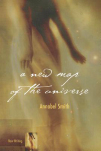
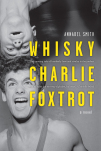

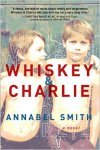
What kind of things pose the greatest challenges?
AS: Balancing the need to earn money with finding time to write is an ongoing challenge. I’m always trying to work out ways to earn the highest possible amount of money in the shortest possible amount of hours, so that I’ll have more time for writing; this week, for example, I toyed with the idea of becoming a foot model! At the moment I work two days a week teaching English as a Second Language to international students entering postgraduate courses at Edith Cowan University. I enjoy it a lot but i would give it up in a heartbeat if it meant I could have those two days for writing instead.
Another great challenge is rejection. As a writer, it is part of the terrain, but accepting that at a rational level and coping with it at an emotional level are two entirely different things. The writing life is an endless round of competitions—or publication, for grants, for awards, for sales, for reviews—most of which you don’t win. Sometimes it feels excoriating and I feel like I can’t bear it anymore. But somehow I always do.
Your career has progressed from a debut novel to two subsequent novels. You now have a fourth in the making (Monkey See). What I find remarkable about that collection is the breadth of imagination—four different worlds, four markedly different modes of writing and story…
AS: Two of my novels are firmly in the realist mode, whereas two have speculative fiction elements. One spans half a century, while the other three take place within compressed time periods of a couple of years. One is very poetic, the others are much less consciously prosaic; more conversational. In one we see everything from a single character’s point of view, whereas the other three have multiple narrative voices. The Ark has no real authorial voice as it is an epistolary novel, told as a series of emails, blog posts and other digital communiques. One has historical elements, one is set in the present day, one in the near future, and one in a distant future that resembles the past! I could go on, but I think you get the picture: they are all very different.
But none of these choices have been conscious. I don’t say ‘I’ve tried historical; now I’m going to write something contemporary’; I never set out to write a certain type of book. I get an idea for a story, and the structure and the voice(s) seem to make themselves felt as I begin to write. Commercially, I know it’s not recommended to write books which are all so different to each other, as many readers like authors to produce something ‘same same but different’. But creatively, the thought of being confined to a certain genre, or style is anathema to me. Doing something different with each book means I’m always learning and that’s what keeps me interested. Having said that, I do sometimes wonder why I always have to make things so difficult for myself!
Those who know you might coin it ‘an Annabel moment’—one of disarming honesty—when, as an established author, you posted your meager annual salary online for all to see. What did you learn from the flood of responses to that blog post?
Royalties $2,210
Speaking events $4,350
Other publications $500
Lending rights $260
Total: $7,320
AS: The first thing I learnt is that telling the truth about what you earn (if it’s not much) is practically unheard of, which is why it received so much attention. The responses suggested that I was far from being alone in my lowly financial position: most writers make a pittance. But perhaps my most important takeaway from that post was the realisation that it is perhaps a little entitled to expect to make a living from writing when so few people do. Why should I be different to the rest? There are many writers out there who fully expect to have to work full-time to support their writing, and the idea of being able to write for a living is a fairly modern (and mostly unrealistic) one. I explored some of the issues around why writers earn so little in a follow-up piece I wrote for The Wheeler Centre.
You read a phenomenal volume and range of novels, and you regularly review them on your blog. Do you fork out squillions on books? How do you make the time to read and review?
AS: A majority of the books I read come from the library. For the most part, I only buy books if I’m a long-term fan of an author’s work, or if I start reading and love a book so much I want to underline all my favourite bits! When I am really into a book I neglect all my other duties in favour of reading. I let my son watch TV, tell my husband it’s takeaway for dinner, and ignore anyone who tries to speak to me! I’ve stopped reviewing now. It was very time-consuming, and began to feel like a chore instead of a pleasure. Also I got into some sticky situations with other writers who took umbrage at what I’d said about their books.
As well as writing, reading and blogging, you chair writing festival sessions, to fine acclaim! Do you ever feel nervous? How important is the chair to making a scintillating festival session? What advice would you give yourself, and the author(s) you interview, when readying for a session?
AS: I was extremely nervous when I first started chairing. I felt a tremendous responsibility to give each author a chance to showcase their books as well as making sure the audience felt ‘entertained’ by the discussion. I’m not really nervous now I’ve had more practice; I enjoy it very much, and I’ve been blessed with very lovely interviewees who’ve made me feel at ease.
My mum always said ‘you can’t make a silk purse out of a sow’s ear’ and this holds true when it comes to chairing: even a first-rate chair can’t make a dull guest interesting. But a poor chair can ruin a potentially fantastic discussion (and I have, unfortunately, seen this happen many times).
The most essential ingredient for the chair is preparedness: you have to know the books to be discussed inside out. (I usually read each one twice, making notes as I go). It’s vital to craft questions that dig into the most important or interesting aspects of the books—whether those relate to origin stories, style, themes etc. After that, you just have to get out of the way as much as possible and let the authors talk.
Monkey See, your new work in progress, is at its final stage of revision. Can you give us a sneak preview?
AS: I always feel a little embarrassed when I describe this project because, even to my own ears, it sounds totally crazy. So, keep an open mind folks! It’s a contemporary take on an epic quest story, or what I like to describe as a rollicking tale of adventure!
In a post-technological future which resembles the past, the city of Santiago, Chile is in thrall to a sadistic cult which claims to ward off tsunamis by sacrificing mute children to the ocean. When a young, mute boy is captured, his teenage brother Uardo joins the cult in a bid to protect him. But after encountering Chacho, a super-intelligent, technologically-enhanced spider monkey, and his sidekick, a cocaine-addicted former scientist named Danior, Uardo realises that the only way to save his brother is to overthrow the cult before the next tsunami strikes.
Bring on the unleashing!
Finally, any words of advice to fellow writers?
AS: As a writer, it’s easy to get fixated on outcomes: finishing the book, getting an agent, getting a publisher, winning a prize, making a bestseller list etc. But, for most writers, the outcomes are not the reason you started writing; they’re simply perks along the way. The real and lasting satisfaction comes from the work itself, so I always remind myself to enjoy the process.
Visit Australian author Annabel Smith at: http://annabelsmith.com
Filed under: Publishing, Top Shelf, Uncategorized, Words for Writers Tagged: A New Map of the Universe, Annabel Smith, The Ark, tips for writers, Whiskey & Charlie, Whisky Charlie Foxtrot, writing festivals


April 6, 2016
Hipstamatic
The phone app I most love messing around with is my Hipstamatic camera. Lenses, films, flash bulbs: there’s no end of playtime fun and funky effects. Here’s a selection from a driving trip across Australia.
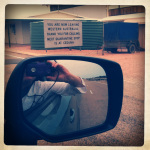
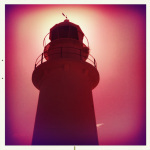
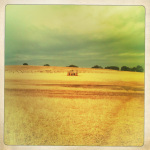
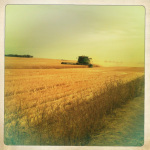
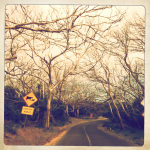
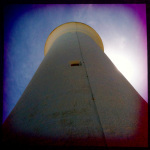
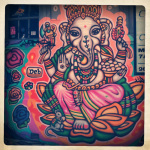

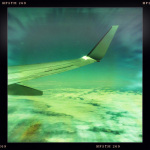
Filed under: Image of the week, Uncategorized Tagged: Hipstamatic, lighthouse, photography


March 29, 2016
Readers on Reading
Picture bobbing across the South Atlantic Ocean on a small ice-strengthened vessel, the subAntarctic island of South Georgia still vivid in your mind, the Falkland Islands in your wake, westward bound for Tierra del Fuego. This is where you will find my colleague and guest reader ELENA WIMBERGER. Elena has spent several Antarctic and Arctic seasons working as Hotel Manager aboard MV Polar Pioneer, a mighty little ship that carries adventurers to wild and wondrous places.

Kitted up for adventure, Elena Wimberger spent a good while hoping for an opportunity to explore the slopes of the Antarctic Peninsula. Photo ©Alan Burger
When it comes to outdoor adventure, you’ll find Elena raring to go. She claims that despite attending school for 16 years, graduating in Political Science and Spanish, she received her true education through time spent outside…
EW: Growing up spending summers in the North Cascade mountain range of Washington State, USA, I learned the value of a good walk in the woods. This led me to forego a sane and sensible career choice following graduation, and instead ask to be dropped off at the Mexican border, with pack in tow, in order to take a very long walk home… I spent the next five months on a trail meandering north to the Canadian border.

Where better to try out your skis than on a favourite slope? Elena Wimberger at Neko Harbor, Antarctic Peninsula. Photo ©Alan Burger
Elena, share with us something you love about your life:
EW: While my love for travel and experiencing new places has been a major directive throughout my life, I treasure the surrounding landscape where I’ve grown up and call home: the Pacific Northwest in the USA. I live at the base of the Puget Sound, surrounded on one side by the Cascade Mountain Range, and the other, a lovely waterway full of islands which leads out to the Pacific ocean. The temperate climate creates a luscious green panorama filled with evergreen pines and sword fern undergrowth. The beauty and easy access to outdoor exploration makes this area a very special place to be and I feel very lucky to have this as my home base.
And now to your favourite book of recent times:
The Brothers K by David James Duncan is a title that plays on Russian author Fyodor Dostoevsky’s The Brothers Karamazov, as well as referring to a strikeout in baseball, denoted by the letter K.
EW: This is a masterpiece of a story, more like a mural than a single work of art. Starting in the mill town of Camas, Washington in 1956, The Brothers K tells the interwoven story of the Chance family a baseball-playing father, an overly religious mother, four sons and twin daughters. The story is narrated by the youngest son, Kincaid (Kade), as he observes the trials and tribulations of his three older brothers and two younger sisters growing up in America in the ’60s and ’70s. Humorous yet profound, Duncan weaves a beautiful tale about family, coming of age and the circumstances of life, using baseball as the medium that brings it all together. Each character is profoundly mortal in a different way and watching each member of the Chance family navigate their way through the many curve balls life throws with a distinctive, albeit at times belated, sense of grace, leaves you wanting more from the start.
He said, there’s two ways for a hitter to get the pitch he wants. The simplest way is to not want any one in particular. But the best way, he said which sounds almost the same but is really very different, is to want the very pitch you’re gonna get. Including the one you can handle. But also the one that’s gonna strike you out looking. And even the one that’s maybe gonna bounce off your head. —Papa Toe, The Brothers K
With thanks to my inspirational guest reader Elena Wimberger as another adventurous Antarctic season draws to a close.
Filed under: Readers on reading, Uncategorized Tagged: Antarctica, David James Duncan, Elena Wimberger, Polar Pioneer, The Brothers K





